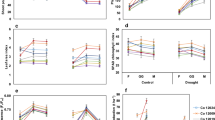Abstract
In order to identify parents for drought resistance breeding, performance of 645 Co selections derived from sixteen parents grown under water deficit conditions was assessed for thirteen characters governing early growth at 150 days and cane yield and juice quality at 360 days after planting at Coimbatore (India). Maximum survival under drought was observed in the derivatives of Co 449, while Co 312 and Co 6304 produced more selections with early vigour. However, at 360 days, a distinct superiority of the parents Co 7201 and CoC 671 was observed for cane yield parameters, while the derivatives of Co 312, Co 421, Co449 and Co 1158 were inferior. CoC671 and Co 740 with better mean performance of juice quality traits would serve as useful parents for quality improvement under drought situations. Significantly better performance of derivatives of CoC 671, both for cane yield and juice quality, revealed the high parental value of this clone. Co 740, Co 775, Co 6304, Co 6806, Co 7201 and Co 775 were the other useful parents. Utilization of these potential parents in breeding could lead to evolving drought resistant varieties for improving sugarcane productivity in the drought prone regions of India.
Similar content being viewed by others
References
Domaingue. R. (1995). Family and varietal adaptation of sugarcane to dry conditions and relevance to selection procedures. Proc.Congress of Intern. Soc. Sugarcane Technol,21: 418–436.
Gascho, G.J.and Sheh, S.F. (1983). Sugarcane. In: Crop Water Relations. (ed. I.D. Teare &M.M. Peet), John Wiley &Sons. New York. pp 445–479.
Hemaprabha, G.,Nagarajan, R.and Alarmelu, S. (2004). Response of sugarcane genotypes to water deficit stress.Sugar Tech.,6(3): 165–168.
Naidu, K.M. (1978). Drought resistance in sugarcane- A review. Biennial conference on sugarcane Research and Development workers of Andhra Pradesh.
Singh, R.K.and Chaudhary, B.D. (1985). Biometrical methods in quantitative genetic analysis. Kalyani Publishers, New Delhi.
Singh, S. and Naidu, K.M. (1985). Effect of soil moisture stress on quality of early and late maturing varieties of sugarcane. Proceed. National Seminar on Plant Physiol. Indian Soc. PI. Phy. held at Varanasi. p 87.
Singh. S.and Reddy, M.S. (1980). Growth, yield and juice quality performance of sugarcane varieties under different soil moisture regimes in relation to drought resistance.Proc. Intern. Soc. Sugar Cane Technol,27(1): 541–555.
Srivatsava, R.P,Johari, Dand Singh, G.P. (1997). Varietal performance under soil moisture stress in sugarcane(Saccharum officinarum).Indian J Agric. Sci.,67(12): 597–598.
Venkataramana, S.,Rao, P.N.G.and Naidu, K.M. (1986). The effects of water stress during the formative phase on stomatal resistance and leaf water potential and its relationship with yield in ten sugarcane varieties.Field Crop Res.,13: 345–353.
Venkataramana. S. (2002). Physiological basis of drought resistance. Winter School on Sugarcane Breeding and Genetics in retrospect and prospects. Sugarcane Breeding Institute, Coimbatore (India), pp:200–205.
Author information
Authors and Affiliations
Corresponding author
Rights and permissions
About this article
Cite this article
Hemaprabha, G., Nagarajan, R., Alarmelu, S. et al. Parental potential of sugarcane clones for drought resistance breeding. Sugar Tech 8, 59–62 (2006). https://doi.org/10.1007/BF02943743
Received:
Accepted:
Published:
Issue Date:
DOI: https://doi.org/10.1007/BF02943743




